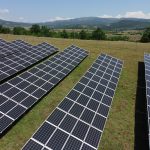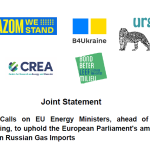European leaders must be ready to do more to respect climate science and protect our future, writes Wendel Trio.
Wendel Trio is the director of Climate Action Network (CAN) Europe.
Next week climate action will be on the agenda again as EU leaders meet for a summit in Brussels. They must remember that for Europe, climate leadership is not just a moral duty, it’s an economic and social opportunity that we can’t afford to miss.
The Paris Agreement sets the goal of limiting global temperature rise to 1.5°C. The action required to achieve this will be wide, far-reaching and transformative. But the effort needed to succeed, and the potential rewards to be gained, will depend on how far and how fast we can move. And we need to act quickly. Even despite major new announcements from the EU, the US and others, the UN’s Emissions Gap Report still predicts that current efforts equal a temperature rise of 2.5°C – well above the Paris Agreement’s objective.
As a rich industrial economy and a major historic emitter, the EU needs to take a lead in combating dangerous climate change. Contributing to the 1.5°C goal and respecting principles of global equity would mean that the EU should cut emissions by at least -65% by 2030 and achieve climate neutrality in 2040.
Delaying action will make everyone worse off. Doing less today will mean increasing the cost of action tomorrow disproportionally, with grave consequences on intergenerational justice. This has also been confirmed by the recent historic ruling by Germany’s top court that the country’s lack of climate ambition amounted to a breach of young people’s fundamental rights.
The coming decade is vital to ensure that the Paris Agreement objectives can still be met. This is why the upcoming revamp of key EU climate and energy legislation is such a crucial opportunity to substantially increase climate ambition and action across the EU.
The European Commission will put forward a set of proposals that they are calling the ‘Fit For 55’ package. The name is derived from the EU’s target of reducing net greenhouse gas emissions by at least 55% by 2030, compared to 1990 levels. However, what we need is a “fit for 1.5°C” package, which puts EU climate and energy legislation in line with the Paris Agreement’s objectives.
The package should thus enable the EU to go beyond 55% net emission cuts and ensure that the 2030 targets of all key climate files are substantially increased. In particular, sectors covered by the EU Emissions Trading System (ETS) should cut emissions by at least 70% and the sectors covered by the Effort Sharing Regulation should achieve at least 50% emission cuts in 2030, compared to 2005 levels. The latter will also mean that all Member States need to take responsibility and increase their national binding targets in order to achieve a higher collective ambition.
But getting the targets right is only part of the solution. The EU also needs to make sure that its policy architecture is fit for purpose. The Commission is considering including emissions from road transport and buildings into the Emissions Trading Scheme and potentially repeal the Effort Sharing Regulation and its national targets. This would move things in the wrong direction as extending emissions trading to transport and buildings risks undermining Member States’ accountability for climate action in these key mitigating sectors. Instead, emissions from transport and buildings should remain part of the Effort Sharing Regulation, Member States’ targets need to increase and governance processes and transparency strengthened.
However, it is not just out of duty that we must act to accelerate climate action. Moving further, more quickly will also have huge economic and social benefits.
By raising climate ambition, European leaders can open the door to millions of future-proof jobs, cleaner and healthier places to live and work, and safe and secure energy without the geopolitical turmoil fuelled by oil and fossil gas. And would allow us to avoid the massive economic disruption that is linked to a temperature rise above 1.5°C.



